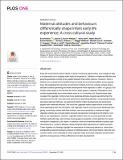Maternal attitudes and behaviours differentially shape infant early life experience : a cross cultural study
Abstract
Early life environments afford infants a variety of learning opportunities, and caregivers play a fundamental role in shaping infant early life experience. Variation in maternal attitudes and parenting practices is likely to be greater between than within cultures. However, there is limited cross-cultural work characterising how early life environment differs across populations. We examined the early life environment of infants from two cultural contexts where attitudes towards parenting and infant development were expected to differ: in a group of 53 mother-infant dyads in the UK and 44 mother-infant dyads in Uganda. Participants were studied longitudinally from when infants were 3– to 15–months-old. Questionnaire data revealed the Ugandan mothers had more relational attitudes towards parenting than the mothers from the UK, who had more autonomous parenting attitudes. Using questionnaires and observational methods, we examined whether infant development and experience aligned with maternal attitudes. We found the Ugandan infants experienced a more relational upbringing than the UK infants, with Ugandan infants receiving more distributed caregiving, more body contact with their mothers, and more proximity to mothers at night. Ugandan infants also showed earlier physical development compared to UK infants. Contrary to our expectations, however, Ugandan infants were not in closer proximity to their mothers during the day, did not have more people in proximity or more partners for social interaction compared to UK infants. In addition, when we examined attitudes towards specific behaviours, mothers’ attitudes rarely predicted infant experience in related contexts. Taken together our findings highlight the importance of measuring behaviour, rather than extrapolating expected behaviour based on attitudes alone. We found infants’ early life environment varies cross-culturally in many important ways and future research should investigate the consequences of these differences for later development.
Citation
Holden , E , Buryn-Weitzel , J C , Atim , S , Biroch , H , Donnellan , E , Graham , K E , Hoffman , M , Jurua , M , Knapper , C V , Lahiff , N J , Marshall , S , Patricia , J , Tusiime , F , Wilke , C , Majid , A & Slocombe , K E 2022 , ' Maternal attitudes and behaviours differentially shape infant early life experience : a cross cultural study ' , PLoS One , vol. 17 , no. 12 , e0278378 . https://doi.org/10.1371/journal.pone.0278378
Publication
PLoS One
Status
Peer reviewed
ISSN
1932-6203Type
Journal article
Description
This research was funded by an ERC (European Research Council: https://erc.europa.eu/funding) Consolidator grant to KES (ERC_CoG 2016_724608).Collections
Items in the St Andrews Research Repository are protected by copyright, with all rights reserved, unless otherwise indicated.

